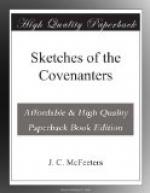James Guthrie had preached, spoken, written, voted, and protested against the “Resolution” and the “Resolutioners,” because they had approved of the suspension of the Moral Test for office.
He had written and published a message to the nation, entitled “The Causes of God’s Wrath”, pointing out the many breaches of the Covenant, and pleading for repentance.
He had declined the king’s authority, when cited to be tried for ministerial services which his enemies accounted treasonable.
He had advocated Christ’s supremacy over the Church and over the nation, and had disputed the king’s authority in ecclesiastical matters.
For pursuing this course of action, James Guthrie was charged with “high treason.” But the rudest terms of the world and the basest charges made by men are often turned into heaven’s fairest badges. The iron chains that manacled Rutherford he called “gold”; he called his prison “The King’s Palace.”
How could Guthrie have done otherwise, as a faithful minister of Christ Jesus, in the high calling of the Gospel? Was he not responsible for the honor of the Church? Was he not entrusted with the truth and claims and glory of Christ? Was he not accountable for the souls that waited on his ministry?
Guthrie had an exalted view of the Gospel ministry. He had the eagle’s eye to take in a wide horizon, and the lion’s heart to meet dangers and difficulties. He took his instructions from the Lord, and stood above the fear of man. He lived with the open Bible in his hand; his soul delighted in the deep, broad sublime truths of salvation. The ministers of the Covenant in those days dwelt in the bosom of Jesus Christ, breathed His spirit, saw His glory, pulsated with His love, and were irresistibly carried forward in the discharge of the duties of their high office. They served as the ambassadors of the King of heaven. Only by dishonoring their office, vitiating their conscience, shrivelling their manhood, disowning their Lord, and imperiling their souls, could Christ’s ministers do less than James Guthrie had done. Yet he was charged with “high treason.”
The trial was set for April 11, 1661. Guthrie came before the tribunal, full of peace and comfort. He answered for himself in a masterly speech. His pleading was deeply felt; some members of the court arose and walked out, saying, “We will have nothing to do with the blood of this righteous man.”
He was urged to retract. He was offered a high office in the Episcopal Church if he would accede to their terms. Such inducements he held in contempt. Neither threat nor reward could weaken his loyalty to the Lord Jesus Christ and the Covenant. The closing sentence of his defence was tender, fearless, and sublime:
“My lords, my conscience I cannot submit; but this old crazy body and mortal flesh I do submit, to do with it whatever ye will, whether by death, or banishment, or imprisonment, or anything else; only I beseech you to ponder well what profit there is in my blood. It is not the extinguishing of me, or many others, that will extinguish the Covenant and the work of Reformation. My blood, bondage, or banishment will contribute more for the propagation of these things, than my life or liberty could do, though I should live many years.”




